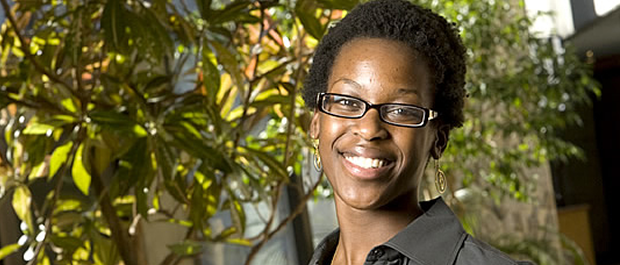Last year, Alethea Duncan brought a change of clothes to her lab nearly every day. When she's working, she has to wear something she's not afraid to ruin—a giveaway T-shirt, an old pair of jeans—in case of chemical splashes or other mishaps. After work, she would head down the hallway to the bathroom, where she would don a suit, and voilà, where a chemist had entered, the president of the Graduate and Professional Student Council (GPSC) would emerge.
Now, between her fourth and fifth years as a Ph.D. student in the chemistry department, she finally has a moment to breathe. Her GPSC term ended in May, and this summer she has been in the lab, investigating the conditions in which certain complex chemical reactions take place. She has been keeping odd hours because of the need to check her experiments every twelve or twenty-four hours.
Her field is organometallic chemistry, which investigates how metals aid or otherwise affect organic bonding. Her research could lay the groundwork for the development of new organic compounds like those used in pharmaceuticals.
A native of Trinidad and Tobago who was raised in Miami, Duncan graduated with a bachelor's degree from the Johns Hopkins University before coming to Duke. In her first year of grad school, she got involved with GPSC; she became the student life co-chair at the start of her third year. She worked to institute movie nights and other alcohol-free programming for students with families and children, addressing what she saw as a need to reach out to diverse elements of the graduate student population.
GPSC is an umbrella organization for Duke's eight graduate and professional schools. One of its main aims is to advocate on behalf of students, who because of their disciplinary atomization and intense work schedules, tend to be less visible on campus.
As president, she pushed for more opportunities for personal development like mentoring programs, more accessible mental-health services, and enhanced career counseling. "Most graduate students are encouraged to go into academia, and if you don't want to do that, you need to seek advice of someone other than your adviser," she says. As a result of her work, career services, which currently has one dedicated staff person for 2,800 graduate students, is looking to hire two more.
She also mandated greater transparency within GPSC, offering online summaries of executive council meetings, as well as of general assembly proceedings.
A self-described busybody who says she likes having a full calendar, Duncan is nevertheless thankful for the break afforded by the end of her term. Last year, she says, she would clear out one night, usually over the weekend, just to answer all the e-mail that had piled up during the week.
Duncan says that living a dual life as a chemist and the president of GPSC provided a much-needed equilibrium. On a given day in the lab, she saw "about four people and a whole lot of chemicals," but with GPSC, the experience was something of a polar opposite. "One [was] a distraction from the other. It kind of balanced me out."

Share your comments
Have an account?
Sign in to commentNo Account?
Email the editor